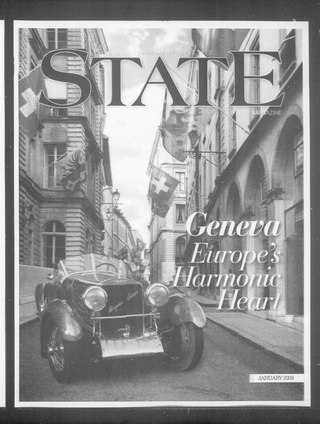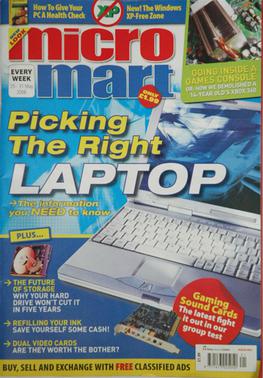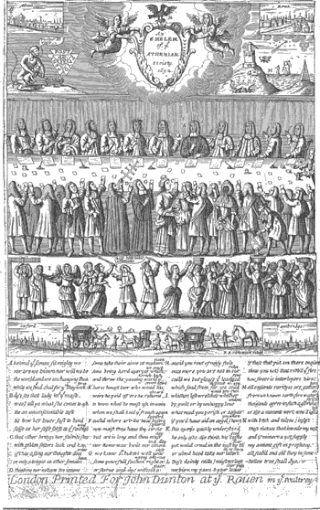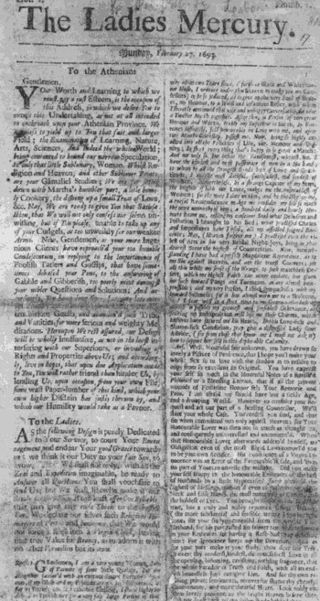
A magazine is a periodical publication, generally published on a regular schedule, containing a variety of content. They are generally financed by advertising, purchase price, prepaid subscriptions, or by a combination of the three.

Computer magazines are about computers and related subjects, such as networking and the Internet. Most computer magazines offer advice, some offer programming tutorials, reviews of the latest technologies, and advertisements.
Peter Anthony Motteux was a French-born English author, playwright, and translator. Motteux was a significant figure in the evolution of English journalism in his era, as the publisher and editor of The Gentleman's Journal, "the first English magazine," from 1692 to 1694.
This article contains information about the literary events and publications of 1693.

The Sunday Post is a weekly newspaper published in Dundee, Scotland, by DC Thomson, and characterised by a mix of news, human interest stories and short features. The paper was founded in 1914 and has a wide circulation across Scotland, Ulster, and parts of Northern England.

Run was an American computer magazine published monthly by IDG Communications with its first issue debuting in January 1984. Bi-monthly publishing began in June/July 1990, and went on until the magazine folded in November/December 1992. In its heyday, Run's monthly circulation was in the 200,000–300,000 range. Folio, the trade journal of the magazine industry, rated it as the second fastest-growing U.S. magazine of 1985.

An advice column is a column in a question and answer format. Typically, a reader writes to the media outlet with a problem in the form of a question, and the media outlet provides an answer or response.

Astronomy is a monthly American magazine about astronomy. Targeting amateur astronomers, it contains columns on sky viewing, reader-submitted astrophotographs, and articles on astronomy and astrophysics for general readers.
John Dunton was an English bookseller and writer. In 1691 he founded The Athenian Society to publish The Athenian Mercury, the first major popular periodical and first miscellaneous periodical in England. In 1693, for four weeks, the Athenian Society also published The Ladies' Mercury, the first periodical published that was specifically designed just for women.

St. Nicholas Magazine was a popular monthly American children's magazine, founded by Scribner's in 1873 and named after the Christian saint. The first editor was Mary Mapes Dodge, who continued her association with the magazine until her death in 1905. Dodge published work by the country's leading writers, including Louisa May Alcott, Frances Hodgson Burnett, Mark Twain, Laura E. Richards and Joel Chandler Harris. Many famous writers were first published in St. Nicholas League, a department that offered awards and cash prizes to the best work submitted by its juvenile readers. Edna St. Vincent Millay, F. Scott Fitzgerald, E. B. White, and Stephen Vincent Benét were all St. Nicholas League winners.

Micro Mart was a weekly computer magazine published in the United Kingdom by Dennis Publishing Ltd. As of 2015, it had a circulation of 5,422. In a letter to subscribers in December 2016 it was announced that the magazine would cease publication with issue No 1445 : "After 30 amazing years of telling it like it is, Micro Mart magazine is logging off."

Parents was an American monthly magazine founded in 1926 that featured scientific information on child development geared to help parents in raising their children. Subscribers were notified of the magazine’s dissolution via a postcard mailing in March 2022.

The Athenian Society was an organization founded by John Dunton in 1691 to facilitate the writing and publication of his weekly periodical The Athenian Mercury. Though represented as a large panel of experts, the society reached its peak at four members: Dunton, Dr. John Norris, Richard Sault and Dunton's brother-in-law, Rev. Samuel Wesley. The group would answer the questions of readers about any topic, creating the first advice column. In 1693, for four weeks, The Athenian Society published also The Ladies' Mercury, the first periodical published that was specifically designed just for women.

The Ladies' Mercury was a periodical published in London by the Athenian Society notable for being the first periodical in English published and specifically designed for women readers.

Ann Landers was a pen name created by Chicago Sun-Times advice columnist Ruth Crowley in 1943 and taken over by Esther Pauline "Eppie" Lederer in 1955. For 56 years, the Ask Ann Landers syndicated advice column was a regular feature in many newspapers across North America. Owing to this popularity, "Ann Landers", though fictional, became something of a national institution and cultural icon.
Richard Sault was an English mathematician, editor and translator, one of The Athenian Society. On the strength of his Second Spira he is also now credited as a Christian Cartesian philosopher.
Gazette d'Amsterdam was one of the most important international European newspapers of the Enlightenment period and a major source of political information. It was a French language bi-weekly newspaper published in Amsterdam from the second half of the 17th century till 1796, during the Batavian Republic.

Savage Love: Straight Answers from America's Most Popular Sex Columnist is a non-fiction book by sex columnist Dan Savage. It was first published in 1998 by Plume.
This article addresses the history of women's magazines.














